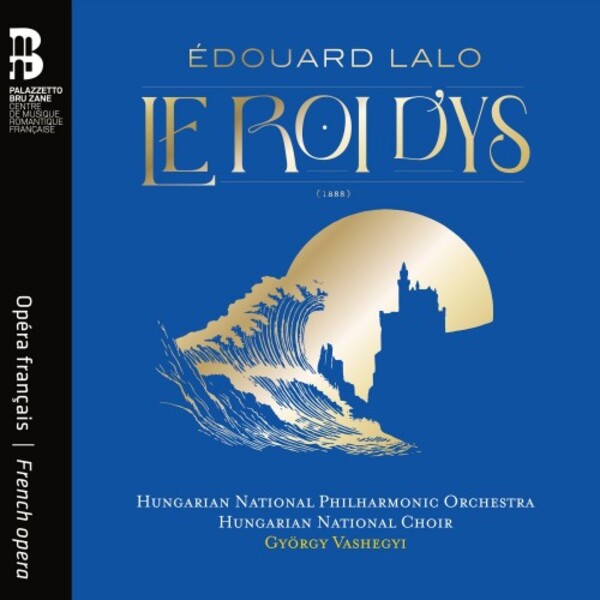LALO Le roi d’Ys (Vashegyi)
View record and artist detailsRecord and Artist Details
Genre:
Opera
Label: Bru Zane
Magazine Review Date: 06/2025
Media Format: CD or Download
Media Runtime: 101
Mastering:
DDD
Catalogue Number: BZ1060

Tracks:
| Composition | Artist Credit |
|---|---|
| (Le) Roi d'Ys |
Edouard(-Victoire-Antoine) Lalo, Composer
Christian Helmer, Jahel; Saint Corentin, Baritone Cyrille Dubois, Mylio, Tenor György Vashegyi, Conductor Hungarian National Chorus Hungarian Philharmonic Chamber Orchestra Jérôme Boutillier, Karnac, Baritone Judith Van Wanroij, Rozenn, Soprano Kate Aldrich, Margared, Mezzo soprano Nicolas Courjal, King, Bass |
Author: Tim Ashley
This new recording of Le roi d’Ys is long overdue. Lalo’s wonderful opera, premiered in Paris in 1888, remains on the fringes of the repertory in the French-speaking world: its outings elsewhere have been infrequent, though ironically the set’s appearance follows closely on from a superb concert revival in London by the Chelsea Opera Group, the first performance in Britain for several decades. Its appearances on disc have also been sporadic, though they include fine versions by André Cluytens from 1957 (Warner, 10/84) and Pierre Dervaux from 1973 (Le Chant du Monde, 9/88), both officially released in the UK long after they were made. The Bru Zane set is consequently a major addition to its discography.
At its premiere, the opera was paradoxically admired both for its apparent Wagnerism and as a radical counter to it, a disparity of opinion that in fact gives us some understanding of its originality and force. The source was the then popular Breton legend of the city of Ys that vanished, Atlantis-like, beneath the ocean in an almost apocalyptic flood (Debussy’s ‘La cathédrale engloutie’ also derives from it). There are echoes of Elsa and Ortrud in Lalo’s depiction of the King’s daughters, gracious Rozenn and obsessive Margared, both in love with the soldier Mylio. Later we are reminded of Ortrud and Telramund, as Margared, furious and bitter on discovering Mylio loves Rozenn, conspires with Karnac, leader of Ys’s enemies in war, to destroy the city by opening the floodgates that protect it from the sea.
The dark scoring, brazen and military, also reveals Wagner’s influence, yet Lalo’s conciseness of expression and avoidance of symphonic development is the antithesis of Wagnerian expansion, resulting in a compact work of often shocking tension lasting only an hour and 40 minutes. Relentless rhythms, suggestive of obsession or driving ambition, propel the drama forwards, and brief moments of lyricism are repeatedly undermined by Margared’s extraordinary vocal writing, angular, declamatory, anticipating 20th-century expressionism.
It’s not an easy work to bring off as the remorseless emotional pitch can be difficult to sustain, but György Vashegyi and his Hungarian forces admirably capture its hurtling momentum and the almost unnerving ferocity of its war music as well as the beauty of the love scenes between Rozenn and Mylio. Just occasionally some of the syncopated rhythms, derived from Breton folk music, could do with a bit more emphasis and definition, but the playing is exhilarating, the brass thrilling, the woodwind beautifully focused. The Hungarian National Choir, meanwhile, tackle Lalo’s demanding choral writing with considerable panache, elated and joyous in the choral dances that surround Mylio and Rozenn’s wedding, yet fierce and ruthless in their demands for war or retribution for the city’s destroyers.
Kate Aldrich makes a formidable Margared, admirably secure over the role’s immense span, words etched with considerable vehemence throughout. Just occasionally you miss the implacable majesty of Jane Rhodes for Dervaux, but this is a compelling performance nevertheless, superbly foiled by Judith van Wanroij’s Rozenn, radiant yet at times tellingly strong in facing her sister’s rages. Cyrille Dubois’s Mylio, more lover than soldier, needs a bit more weight in his tone when rousing his troops, but his singing is consistently beautiful and unlike most Mylios he possesses a genuine high pianissimo, heard to ravishing effect in his famous Aubade and scenes with van Wanroij. Nicolas Courjal has some moments of cloudy tone as the King, though Jérôme Boutillier is magnificent as Karnac, a lethal man prepared to sell his soul to the devil for victory in battle. A fine achievement, in short, that should hopefully win this much undervalued opera many new admirers.
Discover the world's largest classical music catalogue with Presto Music.

Gramophone Digital Club
- Digital Edition
- Digital Archive
- Reviews Database
- Full website access
From £8.75 / month
Subscribe
Gramophone Full Club
- Print Edition
- Digital Edition
- Digital Archive
- Reviews Database
- Full website access
From £11.00 / month
Subscribe
If you are a library, university or other organisation that would be interested in an institutional subscription to Gramophone please click here for further information.




